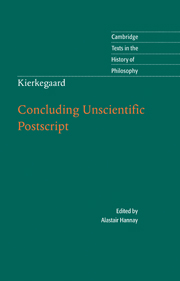Book contents
- Frontmatter
- Contents
- Introduction
- Chronology
- Further reading
- Note on the translation
- CONCLUDING UNSCIENTIFIC POSTSCRIPT TO THE PHILOSOPHICAL CRUMBS
- Preface
- Contents
- Introduction
- Part One The objective problem of Christianity's truth
- Part Two The subjective problem. The subject's relation to the truth of Christianity, or what it is to become a Christian
- 1 An expression of gratitude to Lessing
- 2 Possible and actual theses of Lessing
- 1 Becoming subjective
- 2 The subjective truth, inwardness; truth is subjectivity
- 3 Actual, ethical subjectivity; the subjective thinker
- 4 The problem of the Crumbs: how can an eternal happiness be built on historical knowledge?
- 5 Conclusion
- Appendix: Understanding with the reader
- A first and last declaration by S. Kierkegaard
- Index
- Cambridge Texts in the History of Philosophy
2 - The subjective truth, inwardness; truth is subjectivity
Published online by Cambridge University Press: 26 February 2010
- Frontmatter
- Contents
- Introduction
- Chronology
- Further reading
- Note on the translation
- CONCLUDING UNSCIENTIFIC POSTSCRIPT TO THE PHILOSOPHICAL CRUMBS
- Preface
- Contents
- Introduction
- Part One The objective problem of Christianity's truth
- Part Two The subjective problem. The subject's relation to the truth of Christianity, or what it is to become a Christian
- 1 An expression of gratitude to Lessing
- 2 Possible and actual theses of Lessing
- 1 Becoming subjective
- 2 The subjective truth, inwardness; truth is subjectivity
- 3 Actual, ethical subjectivity; the subjective thinker
- 4 The problem of the Crumbs: how can an eternal happiness be built on historical knowledge?
- 5 Conclusion
- Appendix: Understanding with the reader
- A first and last declaration by S. Kierkegaard
- Index
- Cambridge Texts in the History of Philosophy
Summary
Whether you incline to an empirical definition of truth as the agreement of thought with being, or to an idealist definition as the agreement of being with thought, in each case great care must be taken over what is meant by ‘being’, and care must also be taken that the knowing human spirit is not tricked into losing itself in the indeterminate, becoming fancifully what no existing human being ever has been or can be, a phantom with which the individual occupies himself as best he can but without ever making clear to himself, through dialectical middle terms, how he has fallen in with this fantasy, what it means for him to be there, and whether all that effort in it doesn't dissolve into a tautology within a foolhardy venture of the imagination.
If, in the two definitions offered, being is understood as empirical being, then truth itself is transformed into a desideratur and everything then posed in terms of becoming, since the empirical object is unfinished and the existing cognizing spirit itself is on the way to being. The truth thus becomes an approximating whose beginning cannot be posited absolutely, just because there is no conclusion to have retroactive force; whereas any beginning (if it is not arbitrary because not aware of itself as such), when made, does not occur on the strength of immanent thinking but is made on the strength of a decision, essentially on the strength of faith.
- Type
- Chapter
- Information
- Kierkegaard: Concluding Unscientific Postscript , pp. 159 - 251Publisher: Cambridge University PressPrint publication year: 2009

